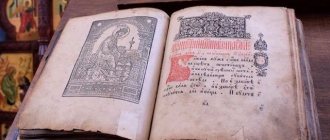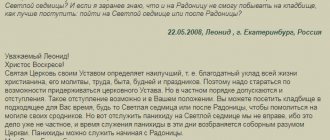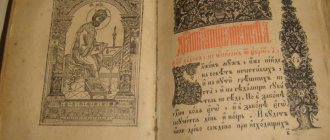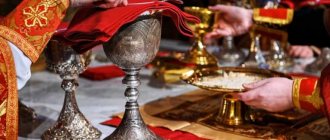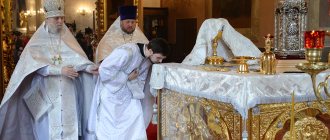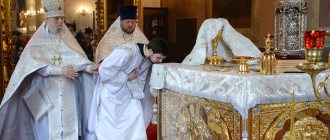Which psalms should be read on what occasions?
We have collected pointers for reading psalms for every need on the advice of Athanasius the Great, Arseny of Cappadocia, Demetrius of Rostov, Ambrose of Optina, Philaret of Moscow and other saints. Armed with them, you will also be able to use the Psalter as a missal. By selecting the desired set of rules below, you will be directed to it via the link.
- About reading the Psalter for every need. According to the writings of St. Athanasius the Great
- Psalms for every day of the week
- Psalms expressing the feelings of the believer
- Psalms expressing the main idea
- Psalms for various needs. According to the advice and instructions of St. Ephraim the Syrian, St. Athanasius the Great, St. Ambrose of Optina and St. Philaret of Moscow
- The Psalter as a missal. Index of Psalms of Saint Arsenios of Cappadocia with the addition of Elder Paisius of the Holy Mountain
You can buy the Psalter with rules for reading in different circumstances in this section. To learn more about the features of each book, go to the publication page.
How to read the psalter at home?
Light a symbolic candle!
It's burning while you're reading. For the laity, the general rules for reading psalms are similar to liturgical ones. Priests give the following advice for those who are just beginning to master home prayers and do not know how to read the Psalter correctly:
- When reading the psalms, it is recommended to light a candle or lamp at home . But the absence of these attributes is not considered a sin. The main thing here is to properly set yourself up for prayer.
- For those who are new to the book of Psalms, you can start reading it in Russian . In the future, as one develops spiritually, one should switch to the Church Slavonic language , in which services are conducted in churches.
- At the same time, it would not be amiss to study the interpretations of the psalms by the holy fathers . This will help you understand the history and meaning of prayers.
- The Church recommends reading the Psalter every day, just like the Gospel . Having finished reading a book, it is recommended to start it again, and so on throughout your life.
- During prayer, sometimes you will have to be distracted by household chores. There is nothing wrong with this, but it is better to devote time to prayers, free from routine affairs .
- At the beginning of each collection there are initial prayers with which to begin reading the Psalter. If you had to stop and continue reading the next day, there is no need to say the opening prayers again . Having completed the entire book, you need to read the prayers that are indicated for reading at the end of the psalms.
- The order of reading the Psalter can be any. But it is best to go from beginning to end, without missing a single kathisma.
- There is no need to read the names of the psalms.
- You can read while sitting. It is necessary to get up only when reading the initial and final prayers, as well as during the “Glories”.
- St. Seraphim of Sarov and St. Ignatius advised reading the book of Psalms in a whisper or in a low voice, but not silently . It is believed that this promotes better perception of prayers and helps maintain attention.
- It is not so much the order of reading that matters, but rather the correct pronunciation . Particular attention should be paid to the stresses in words, since their incorrect placement can distort the meaning of the prayer. You need to read in a slightly chanting manner, monotonously, without showing emotion . The Church believes that theatricality and affectation seduce a person and contribute to his falling into sin.
About reading the Psalter for every need
Compiled from the writings of St. Athanasius the Great
Let everyone, pronouncing psalms, be sure that God will hear those who ask with the psalm word. For if anyone grieves, reading the psalms, he will see great consolation in them. Whether he endures temptations and persecution, singing psalms, he will appear well-skilled, and will be protected by the Lord, who protected the one who spoke the psalm; or he will put the devil to flight and repel his demons. If anyone has sinned, by reading the psalms he will come to his senses and stop sinning. And if someone has not sinned, he sees himself rejoicing that he competes with those who preceded him, and chanting psalms, he prevails in the struggle, and he will never waver in the truth, but will reprove those who deceive and intend to deceive... I heard from wise men that in ancient times among the Israelites, only by reading the Scriptures they cast out demons and exposed the intrigues they perpetrated on people.
So, in various circumstances, read the psalms:
- If you want to be strengthened in hope in God and fearlessness (protection from unclean spirits): Ps. 90.
- If you wish to settle in the house of God and the eternal dwellings of God: Ps. 83.
- If you ask God for bounty: Ps. 66.
- In difficult circumstances of life, in despondency in spirit: Ps. 101.
- If captivated by alien thoughts: Ps. 136.
- When you see the pride and increasing malice of many, you see that people no longer have anything sacred: Ps. eleven.
- When you hear that others are blaspheming the providence, then do not join in their wickedness, but, turning to the Lord, say: Ps. 13.
- If you want to know what a citizen of the Kingdom of Heaven should be like: Ps. 14.
- When you see the oppressed, console them by praying for them and saying to them in these words: Ps. 19.
- If you see the persistence of the lawless in evil, do not think that the evil in them is from nature, as they say - and you will see that they themselves are the reason that they sin: Ps. 35.
- If anyone wants to confuse you and bring you into fear, have trust in the Lord and read: Ps. 10.
- During persecution and reproach of enemies and multitudes who rise up against you: Ps. 3, 24, 26, 41, 139.
- If you want to strengthen yourself against an attacking enemy: Ps. 38.
- Seeing the wicked ones who prepare snares for you: Ps. 5, 7.
- If the malicious intent of your enemies continues, do not lose heart, as if you were forgotten by the Lord, but call on Him, chanting: Ps. 12, 25, 34, 42.
- If you endure sorrow from attackers and want to know the benefits of patience: Ps. 39.
- If you repent of the sin you have committed and pray for mercy: Ps. 50.
- If you want to learn how to give thanks to God: Ps. 28, 104, 106, 134, 145-150.
- Wanting to remember what kindnesses of God were shown to the fathers, how good God is and how ungrateful people are: Ps. 43, 77, 88, 104-106, 113.
- Thanks be to the Lord when He heard you in sorrow: Ps.4:74,114,45 .
- When you are saved from your enemies, delivered from your persecutors: Ps. 17, 9.
- Seeing that the Lord feeds you and prospers your way: Ps. 22.
- Having fallen into the hands of enemies and wisely avoided them, and evaded their evil intentions: Ps. 33.
Prayer book. Fifth edition. Moscow. Synodal printing house, 1897.
How to read the Psalter for the deceased?
Orthodox traditions
- There is a tradition of reading the Psalter over the body of the deceased until his burial, as well as one kathisma within 40 days after death . This must be done continuously until the funeral.
- Relatives of the deceased should read the Psalter night and day without stopping , with the exception of moments when litias or memorial services are performed at the grave.
- Today, reading over the body is almost impossible, but you can divide the day into several segments and distribute time between relatives to read a book at home .
Psalms for every day of the week
There is a specific pslaom for each day of the week. Some of these psalms are inscribed on the day of the week, others contain verses corresponding to the days of the creation of the world or prefiguring the events of Holy Week and the Resurrection of Christ.
- Sunday - Ps. 23;
- Monday – Ps. 47;
- Tuesday - Ps. 66;
- Wednesday – Ps. 93;
- Thursday – Ps. 49;
- Friday - Ps. 92;
- Saturday - Ps. 91.
According to tradition, it is customary to read the entire Psalter about the deceased, but if this is not possible, then kathisma 17.
Days when the Psalter is not read
There are days in the Orthodox calendar when the psalter is not read. In churches and at home, starting from Maundy Thursday and until St. Thomas Week, one should not read the psalms. This period lasts 10 days.
At home, kathisma should be divided into three Glories.
Important!
Kathisma is a special section in the Psalter in which you can sit. There are 20 kathismas.
Before reading the kathisma, you need to read “Our Father...”, after “Lord have mercy” 12 times, and then kneel with prayer.
Psalms expressing the feelings of the believer
- Glorification of God for the works of creation and providence, especially for the good deeds poured out on man: Ps. 102
- Glorifying God for the special care of the believer: Ps. 2
- Without God's blessing it is impossible to have success in your affairs: Ps.126
- God's providence for the believer and his election for eternal life: Ps. 138
- Contrition for sins, a petition to God for mercy at the Judgment: Ps. 37
- The believer’s desire to unite with God and trust in Him in misfortune: Ps. 41
- The bliss of the righteous and the destruction of the wicked: Ps. 1
- Characteristics of a true righteous man and heir of eternal life: Ps. 14
- God forgives sins to those who humbly confess them before Him: Ps. 31
- One should not envy the happiness of sinners, but it is appropriate to look at the end of the lawless and the righteous: Ps. 36
- God's special mercy to the merciful: Ps. 40
- The blessedness of those who dwell in the temple of the Lord: Ps. 83.
- Glorifying the goodness of the Lord to those who trust in Him: Ps. 90
- The firmness of the believer in persecution and the consolation of God’s protection: Ps. 26
- The consolation of the righteous by the constant preservation of God: Ps. 120
- Sighing for the Heavenly Fatherland: Ps. 136
- Sample prayer for the king: Ps. 19.20
Prayer book. Fifth edition. Moscow. Synodal printing house, 1897.
Psalms expressing the main idea
- Each psalm has a main idea. Therefore, all psalms can be divided into groups:
- Glorification of the properties of God: 8, 17, 18, 23, 28, 33, 44, 45, 46, 47, 49, 65, 75, 76, 92, 94, 95, 96, 98, 103, 110, 112, 113, 133, 138, 141, 144, 148, 150.
- Thanks be to God for his good deeds to God’s chosen people: 45, 47, 64, 65, 67, 75, 80, 84, 97, 104, 123, 125, 128, 134, 135, 149.
- Thanks be to God for the good deeds: 22, 33, 35, 90, 99, 102, 111, 117, 120, 144, 145.
- Celebrating God's goodness towards individuals: 9, 17, 21, 29, 39, 74, 102, 107, 115, 117, 137, 143.
- Asking God for forgiveness of sins: 6, 24, 31, 37, 50, 101, 129, 142.
- Trust in God in troubled spirit: 3, 12, 15, 21, 26, 30, 53, 55, 56, 60, 61, 68, 70, 76, 85, 87.
- Appeal to God in deep sorrow: 4, 5, 10, 27, 40, 54, 58, 63, 69, 108, 119, 136, 139, 140, 142.
- Petition for God's help: 7, 16, 19, 25,
34, 43, 59, 66, 73, 78, 79, 82, 88, 93, 101, 121, 131, 143. - Desire to visit the temple: 41, 42, 83.
- Psalms teaching about good and evil: 1, 5, 7, 9, 10, 11, 13, 14, 16, 23, 24, 31, 33, 35, 36, 49, 51, 52, 57, 72, 83, 90, 91, 93, 111, 120, 124, 126, 127, 132.
- About the law of God: 18, 118.
- About the vanity of life: 38, 48, 89.
- On the responsibilities of rulers: 81, 100.
- Prophetic Psalms: 2, 15, 21, 39, 44, 67, 71, 96, 109, 117.
- Psalms in honor of Jerusalem and the Temple of Jerusalem: 14, 23, 67, 86, 131, 133, 134.
- History of the People of God: 77, 105.
- Psalms about the future Messiah, the Lord Jesus Christ: 2, 15, 21, 44, 68, 71, 109.
- About the persons and events of the Old Testament that prefigure the New Testament of the Lord Jesus Christ and His Church: 8, 18, 34, 39, 40, 67, 77, 96, 101, 108, 116, 117.
- Psalms of praise: 112, 113, 114, 115, 116, 117.
Psalter. Reprint edition of the Moscow Patriarchate, 1873
Psalms for various needs
According to the advice and instructions of St. Ephraim the Syrian, St. Athanasius the Great, St. Ambrose of Optina and St. Philaret of Moscow
According to the advice and instructions of the holy fathers of the Church: St. Ephraim the Syrian, St. Athanasius the Great, St. Ambrose of Optina, St. Philaret of Moscow, the Psalter can be divided into psalms for different needs:
- To protect yourself from serious sins: Ps. 18
- Against demonic attacks: Ps. 45, 67
- When accusations and slander are raised against you: Ps. 4, 7, 36, 51
- When you see the pride and malice of many, when people have nothing sacred: Ps. eleven
- For humility of spirit: Ps. 5, 27, 43, 54, 78, 79, 138
- When enemies continue to seek your destruction: Ps. 34, 25, 42
- In gratitude for the victory over the enemy: Ps. 17
- In times of sorrow and misfortune: Ps. 3, 12, 21, 68, 76, 82, 142
- In despondency and in unaccountable sorrow: Ps. 26, 90, 101
- In defense from enemies, in adversity, in the machinations of man and the enemy: Ps. 3, 37, 2, 49, 53, 58, 90, 139
- About standing so that the Lord hears your prayer: Ps. 16, 85, 87, 140
- When you ask for mercy and bounty from God: Ps.66
- If you want to learn how to give thanks to the Lord: Ps. 28
- In order not to be stingy and to give alms: Ps. 40
- Praising the Lord: Ps. 23, 88,92,95, 110, 112, 113, 114, 133, 138
- In illness: Ps. 29, 46, 69
- In mental turmoil: Ps. thirty
- In spiritual pain: Ps. 36, 39, 53, 69
- To console the oppressed: Ps. 19
- From damage and sorcerers: Ps. 49, 53, 58, 63, 139
- When you need to confess the true God: Ps. 9, 74, 104, 105, 106, 107,117, 135, 137
- About forgiveness of sins and repentance: Ps. 6, 24,50,56, 129
- In spiritual joy: Ps. 102, 103
- When you hear that they are blaspheming the Providence of God: Ps. 13, 52
- When you see that the wicked prosper, and the righteous endure tribulations so as not to be offended: Ps. 72
- In gratitude for every good deed of God: Ps. 33, 45, 47, 64, 65, 80, 84, 97, 115, 116, 123, 125, 134, 145, 148, 149
- Before leaving home: Ps. 31,
- On the road: Ps. 41.42, 62, 42
- Before sowing: Ps. 64
- From theft: Ps. 51
- From drowning: Ps. 68
- From the frost: Ps. 147
- In persecution: Ps. 53, 55,56, 141
- On the granting of a peaceful death: Ps. 38
- On the desire to move to eternal settlements: Ps. 83
- For the departed: Ps. 118
- If the evil one prevails: Ps. 67, 142
- About the extraordinary change in affairs: Ps. 67
- Penitential psalms: Ps. 6, 31, 37, 50, 101, 129, 142
- When sadness overcomes: Ps. 101
- Prayer for God to hear your prayer: Ps. 140
The Psalter as a missal. Index of Saint Arsenius of Cappadocia
In defense from demons
- Ps.
6. May God free those under spell. - Ps.
8. Wounded by demons or wicked people. - Ps.
9. May demonic insurance in dreams or temptations during the day cease. - Ps.
13. Read from the demon three times a day for three days. - Ps.
24. Those who suffer greatly from temptations, who murmur and complain. - Ps.
33. Those standing on the verge of death when they are tormented by demons. Or when the enemy invades with sinister intentions. - Ps.
45. Young people who are not allowed to marry by their enemies out of envy. - Ps.
57. May circumstances favor those who work with good intentions, and may - The Lord will rebuke demons and wicked people.
- Ps.
65. May the evil one not bring discord into the house and may not plunge the family into sorrow. - Ps.
70. For those who are lonely, who, due to the machinations of demons, are bored with their neighbors and fall into despair, may the Lord have mercy on them and heal them. - Ps.
90. Let the demon disappear that appears before a person and frightens him. - Ps.
94. Let spouses not fall under the influence of spells that make them quarrel and bicker. - Ps.
96. Let the spell dissipate. - Ps.
121. May the Lord heal those suffering from superstition.
For protection from elements and disasters
- Ps.
17. During earthquakes, other disasters or thunderstorms. - Ps.
21. May the Lord control the fire and may there be no great damage. - Ps.
28. Those suffering from seasickness and fearing a stormy sea. - Ps.
30. May the Lord provide sufficient grain and fruits when the weather is unfavorable for farming. - Ps.
31. May lost and confused travelers find their way. - Ps.
47. When gangs of robbers rob people and grave disasters occur, read for 40 days. - Ps.
50. When God sends us for admonition because of our sins. - Ps.
68. When the rivers flood from the rains and wash away people and houses. - Ps.
85. May God save the world when an epidemic comes and people die. - Ps.
92. May the Lord protect a ship that is in danger at sea (The monk also advised sprinkling the ship on four sides). - Ps.
111. May the Lord protect soldiers going to war. - Ps.
133. May the Lord protect people from every misfortune.
In defense from human hostility
- Ps.
3. Let anger leave people, and let them not torture (offend) their neighbors unrighteously. - Ps.
5. May the Lord heal the eyes wounded by the villain. - Ps.
7. Tormented by fear from the intrigues and threats of villains. - Ps.
10. Abusive spouses who bicker and get divorced (when an abusive husband or wife torments the spouse). - Ps.
11. Mentally ill people who are tormented by anger and attack their neighbors. - Ps.
14. Let thieves or robbers turn back and go home and repent. - Ps.
16. In case of serious unfair accusations, read three times a day for three days. - Ps.
22. May the Lord pacify disobedient children so that they do not upset their parents. - Ps.
26. May the Lord protect the peasants from the enemy army, so that there is no harm to the people and fields. - Ps.
29. In dangers in distant lands, among those who exist, among the barbarians and the godless, may the Lord protect them and enlighten the people of those lands and pacify them, so that they know God. - Ps.
32. May the Lord reveal the truth about those unjustly convicted, and may they be released. - Ps.
33. Those standing on the verge of death when they are tormented by demons. Or when the enemy invades with sinister intentions. - Ps.
34. May the Lord free the good from the snares of the evil ones that oppress the people of God. - Ps.
35. May hostility dissipate after disputes and misunderstandings. - Ps.
36. Wounded by robbers. - Ps.
42. May our compatriots be freed from enemy captivity. - Ps.
47. When gangs of robbers rob people and grave disasters occur, read for 40 days. - Ps.
57. May circumstances favor those who work with good intentions, and may the Lord rebuke demons and wicked people. - Ps.
59. May the Lord reveal the truth when many people are condemned (slandered) unjustly. - Ps.
72. Let the robbers repent. - Ps.
73. May the Lord protect the peasants who work in the fields when the enemy surrounded the village. So that God protects peaceful people who are surrounded by enemies. - Ps.74.
May the evil owner reconcile and not torment his neighbors and workers. - Ps.
78. May the Lord protect the settler from robbery by the enemy army. - Ps.
82. May the Lord forbid the evildoers who plot murder. - Ps.
84. May the Lord heal those wounded by robbers and those suffering from fright. - Ps.
87. May the Lord protect the defenseless who suffer from their hard-hearted neighbors. - Ps.
93. May the Lord enlighten the troublemakers who sow discord among the people and cause unrest and division. - Ps.
107. May the Lord pacify the enemies, and may they abandon their evil intentions. - Ps.
117. May the Lord humble the barbarians when they surround the village and instill fear in the inhabitants, and may he turn them away from evil intentions. - Ps.
118. May the Lord frighten the barbarians and forbid them when they kill innocent women and children. - Ps.
120. May the Lord protect slaves from the hands of the enemy, so that they are not maimed before they return to freedom. - Ps.
124. May the Lord protect the fields of the righteous from evil people. - Ps.
131. May the Lord show His mercy in a world where wars do not stop because of our sins. - Ps.
133. May the Lord protect people from every misfortune. - Ps.
135. May the Lord protect refugees when they leave their homes and go away, may they be saved from their enemies. - Ps.
139. May the Lord pacify the difficult character of the head of the family, so that the family does not suffer from him. - Ps.
140. May the Lord pacify the cruel ruler who torments his neighbors. - Ps.
141. May the Lord pacify the troublemaker who brings grief to people. - Ps.
143. May the Lord pacify the ferment among the people, so that there is no rebellion.
About organizing family life and eradicating hostility among loved ones
- Ps.
10. Abusive spouses who bicker and get divorced (when an abusive husband or wife torments the spouse). - Ps.
19. To barren spouses, so that the Lord heals them and they do not divorce. - Ps.
22. May the Lord pacify disobedient children so that they do not upset their parents. - Ps.
43. May the Lord reveal the truth to the spouses if there was a misunderstanding between them, so that they can live in peace and love. - Ps.
45. Young people who are not allowed to marry by their enemies out of envy. - Ps.
54. May the good name of the family that was unjustly accused be restored. - Ps.
75. To a mother who is afraid during childbirth, may the Lord strengthen and protect her. - Ps.
76. When there is no mutual understanding between parents and children, may the Lord enlighten them, so that children obey their parents, and parents love their children. - Ps.
86. May the Lord prolong the lives of those family members whom others cannot do without. - Ps.
106. May the Lord heal the barren woman. - Ps.
116. May love remain in the family, and may they glorify God. - Ps.
126. May the Lord bring peace to the family if there is a quarrel. - Ps.
127. May the evil of enemies not touch the houses, and may the peace and blessing of God be in the family. - Ps.
139. May the Lord pacify the difficult character of the head of the family, so that the family does not suffer from him. - Ps.
142. May the Lord protect a pregnant woman so as not to lose her fetus.
About healing from illness
- Ps.
4. May the Lord heal those who are soft-hearted and who become despondent at the sight of the deeds of the hard-hearted. - Ps.
5. May the Lord heal the eyes wounded by the villain. - Ps.
7. Tormented by fear from the intrigues and threats of villains. - Ps.
12. Suffering from liver diseases. - Ps.
18. Let the woman in labor give birth. - Ps.
19. To barren spouses, so that the Lord heals them and they do not divorce. - Ps.
27. May the Lord heal those suffering from mental and nervous illnesses. - Ps.
37. For toothache. - Ps.
40. May the wife be delivered successfully if the birth is premature. - Ps.
44. Suffering from heart or kidney disease. - Ps.
55. For soft-hearted people who are hurt by their neighbors. - Ps.
56. Those suffering from headaches resulting from great tribulation. - Ps.
58. To the dumb, may the Lord give them the gift of speech. - Ps.
63. When someone is bitten by a mad dog or a wolf. - Ps.
67. May those suffering from miscarriages be healed. - Ps.
79. May the Lord heal the patient with dropsy. - Ps.
95. May the Lord heal the deaf. - Ps.
102. May the Lord help a woman suffering from female infirmity. - Ps.
106. May the Lord heal the barren woman. - Ps.
108. May the Lord heal the sick person with epilepsy. May the Lord have mercy on the slanderers and admonish them to repent. - Ps.
113. May the Lord heal weak-minded children. - Ps.
122. May the Lord heal the blind and those suffering from eye diseases. - Ps.
125. May the Lord heal those suffering from headaches. - Ps.
128. May the Lord heal those suffering from migraines. May the Lord show His mercy on the hard-hearted and unrestrained, so that they may show mercy. - Ps.
142. May the Lord protect a pregnant woman so as not to lose her fetus. - Ps.
145. May the Lord heal those suffering from bleeding. - Ps.
146. May the Lord heal those bitten and wounded by evildoers.
About help with various everyday needs
- Ps.
1. When a tree or vine is planted, let it bear fruit. - Ps.
15. May the lost key be found. - Ps.
23. May the door open when the key is lost. - Ps.
31. May lost and confused travelers find their way. - Ps.
48. To those whose work is fraught with danger. - Ps.
52. May God bless the nets and may they be filled with fish. - Ps.
62. May the fields and trees bear fruit during the drought. - Ps.
66. Blessing be on livestock. - Ps.
71. May God bless the new harvest that the peasants are reaping. - Ps.
81. So that trade continues among the peasants and they do not fall into grief and despair. - Ps.
83. May the Lord protect household utensils, livestock and the fruits of labor. - Ps.
89. May the Lord send rain in the drought and may the dry springs be filled. - Ps.
123. May the Lord protect people from snakes so that they do not bite. - Ps.
144. May God bless the works of people and accept them. - Ps.
147. May the Lord pacify wild animals, may they not cause harm to people and the economy. - Ps.
148. May the Lord send favorable weather so that people can reap a rich harvest and glorify God.
About the arrangement of relationships between people, reconciliation, admonition and the sending of worldly wisdom and God's help
- Ps.
2. May the Lord enlighten those coming to meetings and councils. - Ps.
3. Let anger leave people and let them not torture (offend) their neighbors unrighteously. - Ps.
14. Let thieves or robbers turn and return home and repent. - Ps.
16. In case of serious unfair accusations, read three times a day for three days. - Ps.
20. May the Lord soften the hearts of the rich and give alms to the poor. - Ps.
34. May the Lord free the good from the snares of the evil ones that oppress the people of God. - Ps.
35. May hostility dissipate after disputes and misunderstandings. - Ps.
38. May the abandoned and discouraged find work so that they will no longer grieve. - Ps.
39. May the owner and the employee make peace after a quarrel. - Ps.
41. Young people, when they suffer from unhappy love. - Ps.
46. In order to reconcile the worker and the owner, when the worker leaves offended by the owner, and to find work for him. - Ps.
51. Let the hard-hearted rulers repent, and let their hearts soften, and let them stop torturing the people. - Ps.
53. May the Lord enlighten the rich who bought slaves, and may they set them free. - Ps.
55. For soft-hearted people who are hurt by their neighbors. - Ps.
60. Those who find it difficult to work out of laziness or fear. - Ps.
64. May merchants prosper. So that they have the fear of God and do not deceive people. - Ps.
69. To the soft-hearted, who are sad and fall into despair over trifles, may the Lord strengthen them. - Ps.
70. For those who are lonely, who, due to the machinations of demons, are bored with their neighbors and fall into despair, may the Lord have mercy on them and heal them. - Ps.
77. May the Lord enlighten creditors so that they will be compassionate and not extort debts from debtors. - Ps.
101. May the Lord bless those in power so that they are kind and compassionate and help people. - Ps. 108.
May the Lord heal the sick person with epilepsy. May the Lord have mercy on the slanderers and admonish them to repent. - Ps.
109. So that the younger ones respect the elders. - Ps.
110. Let unrighteous judges repent and judge the people of God with justice. - Ps.
119. May the Lord grant long-suffering to those who have to live with the evil and unrighteous. - Ps.
128. May the Lord heal those suffering from migraines. May the Lord show His mercy on the hard-hearted and unrestrained, so that they may show mercy. - Ps.
129. May the Lord grant courage and hope to those who are starting a new work and are unskilled in it, and may they not experience great difficulties. - Ps.
132. May the Lord enlighten the peoples, so that they become peace-loving and live in peace. - Ps.
136. May the Lord pacify the hot-tempered. - Ps.
137. May the Lord enlighten the rulers so that they understand the needs of the people.
For assistance in financial and other material difficulties; about promoting well-being and justice
- Ps.
20. May the Lord soften the hearts of the rich and give alms to the poor. - Ps.
38. May the abandoned and discouraged find work so that they will no longer grieve. - Ps.
64. May merchants prosper. So that they have the fear of God and do not deceive people. - Ps.
77. May the Lord enlighten creditors so that they will be compassionate and not extort debts from debtors. - Ps.
80. May the Lord not leave the poor in need and grief, who have fallen into despair from poverty. - Ps.
81. So that trade continues among the peasants and they do not fall into grief and despair. - Ps.
83. May the Lord protect household utensils, livestock and the fruits of labor. - Ps.
88. May the Lord strengthen the sick and weak, so that they do not become exhausted at work and do not fall into despondency. - Ps.
103. May the Lord bless the wealth of people, so that they do not fall into despondency, but glorify God. - Ps.
112. May God bless the poor widow so that she pays her debts and escapes prison. - Ps.
114. May the Lord bless poor children and comfort them, so that they do not suffer from rich children and do not become despondent. - Ps.
137. May the Lord enlighten the rulers so that they understand the needs of the people. - Ps.
144. May God bless the works of people and accept them.
About the sending and return of spiritual fruits, deliverance from passions and correction of life
- Ps.
24. Those who suffer greatly from temptations, who murmur and complain. - Ps. 25. When someone asks something from God, so that he gives what he asks without harm to the one asking.
- Ps.
49. Let those who have wandered away from God repent and turn, that they may be saved. - Ps.
61. May the Lord deliver the weak from adversity, so that he does not grumble. - Ps.
91. May the Lord give prudence to people so that they grow spiritually. - Ps.
97. May the Lord comfort those overwhelmed by grief. - Ps.
98. So that God bless and send grace to the young who want to devote themselves to God. - Ps.
99. May the Lord bless those who do His will and fulfill their desires. - Ps.
100. May the Lord give gifts and talents to kind and simple-hearted people. - Ps.
104. Let people repent and confess their sins. - Ps.
105. May the Lord enlighten people so that they do not deviate from the path of salvation. - Ps.
115. May the Lord heal you from the terrible passion of lies. - Ps.
130. May the Lord grant people repentance and console them with hope so that they can be saved. - Ps.
134. May people concentrate during prayer, and may their souls unite with God. - Ps.
136. May the Lord pacify the hot-tempered. - Ps.
138. May the Lord deliver the weak in spirit from the temptations of blasphemous thoughts.
Conversations with the priest. Weeks after Easter
Audio |
Hegumen Flavian (Matveev), abbot of the Holy Cross Monastery in Yekaterinburg, answers questions from viewers.
Broadcast from Yekaterinburg. — Each Week after Easter has a specific name and is dedicated to important church events: The 2nd Week after Easter is called Antipascha, popularly it is St. Thomas Week, the coming day off is dedicated to the myrrh-bearing women, followed by the Week of the Paralytic, the Week of the Samaritan Woman, the Week of the Blind . Today we will talk about why Sundays after Easter are named in a certain way and are especially highlighted in the church calendar.
But first, explain why the word “Week” in the church calendar refers to only one specific Sunday day, while the usual week from Monday to Sunday in the church calendar is called a week?
— This complexity in terminology is due to the fact that services in the Russian Orthodox Church, the church calendar and all calendar features are conducted in Church Slavonic. This language is similar to Russian only in certain points, but in others it is not very similar or not at all similar. A person who is poorly acquainted with the Church Slavonic language, in order to understand everything correctly, needs to learn the following thing: it is Sunday in Church Slavonic that is called Week, from the word “not to do,” when a person withdraws from all worldly affairs in order to devote to spiritual work, spiritual pursuits, first of all, visiting the temple of God. Usually the entire church community gathers in the temple of God on Sunday. That is why the day on which people do not do or try not to do anything worldly, but are engaged in spiritual work, the day dedicated to the memory of the Resurrection of Christ from the dead, is called Week in Church Slavonic. Accordingly, all Sunday days that have special significance are especially marked in the calendar; they are called that way in the calendar - Week such and such, for example, Week 2 of Easter. The seven-day period of time, which we call a week in Russian, is called a week in Church Slavonic.
Thus, if we are talking about a week in the church calendar, then we mean a seven-day period of time. And if we are talking about the Week, then we mean Sunday, which is marked by one or another memory. It is also important to note this feature of Sundays after Easter - their countdown begins from Easter itself. The 2nd week of Easter is not marked anywhere on the calendar, because it is Easter itself. The 2nd week of Easter begins in Russian a week later, in Church Slavonic - a week after Easter. It is called 2nd Week of Easter.
— We can say that this is a linguistic confusion. It turns out that when we talk about St. Thomas Week, we mean one specific Sunday day - the 2nd Week after Easter?
- Yes, this is the Sunday that follows Easter.
-Why are those Easter Weeks that we mentioned at the beginning of the program highlighted in the church calendar in a special way?
— Indeed, every Sunday, or in Church Slavonic every Week after Easter, is marked with a special memory. Basically, these memories relate to those Gospel readings that are scheduled for these Sundays. Some days are connected by the remembrance of special saints, for example, Sunday, on which the holy fathers of the First Ecumenical Council are remembered - these are already separate church memories, and accordingly a separate Sunday day is dedicated to this memory. Basically these are Gospel readings and special reflections corresponding to them, which are useful for Christians to have. Each of the Gospel readings is devoted to a special topic, with the exception of the Gospel reading on the Sunday of the Myrrh-Bearing Women. These readings are quite long and serious, each of them dedicated to a special incident in the life of the Lord Jesus Christ; they allow a Christian to devote a whole week to understanding the Gospel reading that was discussed at the Sunday holiday service.
— The 2nd week after Easter is called Antipascha, or St. Thomas' week. What is Antipascha?
— Antipascha sounds strange and even threatening, as if it has an anti-Christian meaning. In fact, the word "anti" in Greek means not only "against" but also "instead of." When we say Antipascha, we mean something instead of Easter. We can ask ourselves the question: “Could there be something instead of Easter?” Yes maybe. Instead of Easter, there may be a memory of Easter of slightly lesser power, such a memory that again makes every believing heart tremble, again prompts it to rejoice in the Resurrection of Christ, therefore it is on the next Sunday after Easter that a special remembrance of the Resurrection of Christ takes place. There is even such a church tradition: it is on this day that churches celebrate their patronal feasts, the altars of which are consecrated in honor of the Resurrection of Christ. It seems that the patronal feast day should be on Easter, but church tradition implies that in these parishes the celebration takes place a week later - on the day of Antipascha. This Sunday is also called the Week of Thomas, or St. Thomas Week, or the Week of the Assurance of the Apostle Thomas.
- In fact, each of the Sundays is instead of Easter? After all, that’s why the resurrection is a resurrection, because we remember the most important Christian celebration?
- The way it is. But of all the Sundays, it is Antipascha that we perceive as the most important of the resurrections after Easter.
— Question from a TV viewer from Yekaterinburg: “During Great Lent they said that the prayer of St. Ephraim the Syrian is read only during Great Lent. At the end of the Psalter, after reading the kathismas, it is written that you need to read the prayer of Ephraim the Syrian. Is it possible to read the prayer of Ephraim the Syrian every day?
- Here you can answer with a short church monastic saying that the cell does not know the rules. Therefore, those features that relate to worship in churches may not apply to those prayers that we perform privately, at home. I know that many Christians consider it sublime and edifying to read the prayer of St. Ephraim the Syrian not only during Great Lent, but also on other days. Perhaps only on Easter, when you need to especially rejoice, the repentant prayer of St. Ephraim the Syrian would not be appropriate even in a cell setting. In general, the prayer of Ephraim the Syrian, if it arouses high pious feelings in your soul and encourages you to a good Christian life, of course, can be read in private conditions. But on Bright Week, when in churches they sing about the Risen Christ, when there is a sublime and joyful service, there is hardly any need to move on in private to the deep repentance that the wonderful prayer of St. Ephraim the Syrian carries in itself.
— What event do we remember on St. Thomas Week?
- On St. Thomas Week, the Gospel is read about the assurance of the Holy Apostle Thomas. This is a fairly long gospel narrative, which talks about two meetings of the risen Christ the Savior with his disciples-apostles. It is noted that Christ the Savior appeared to them when they were locked up “for fear of the Jews.” These words mean the fear that gripped the apostles; at that time the Holy Spirit had not yet descended on them, and they were not yet those wonderful preachers of the resurrection of Christ from the dead. These were very frightened people who could fully feel the power of the Jews, who spread the rumor about them that they were deceivers and troublemakers of the people, they stole the body of Jesus from the tomb and declared Him resurrected. At any moment they could be seized, arrested and subjected to the most severe punishment on charges of indignation of the people. The apostles were frightened by this and sat locked up. They were in prayer, but the moment when they were locked up testifies to the circumstances surrounding their lives. The Lord Jesus Christ appears to them, talks with them, gives them peace, teaches them the power to forgive people’s sins (this is even before the descent of the Holy Spirit). We can only imagine what cheerfulness these words of Christ could bring to the apostles. But the Apostle Thomas was not among them at that moment. When the disciples told him that they had seen the Risen Lord, he did not believe it and began to say: “Until I put my fingers into His wounds on his arms and legs, until I put my hand into His wound on his ribs, I will not I'll believe it." His words are exactly repeated by the Lord Jesus Christ when the apostles were already gathered together with the Apostle Thomas. Christ the Savior, appearing among them, “said to Thomas: put your finger here and see my hands; give me your hand and place it in my side; and do not be an unbeliever, but a believer” (John 20:27). Thomas, immediately convinced not so much that he needs to put his hand and feel the wounds, but also that Christ is repeating exactly the words that he spoke to his fellow apostolic ministers, throws himself at the feet of the Savior and says the words of confession of faith: “ My Lord and my God!” At that moment, Thomas was one hundred percent sure. Christ the Savior immediately reinforces him: “Jesus says to him: You believed because you saw Me; Blessed are those who have not seen and yet have believed” (John 20:29). Here the Apostle Thomas appears not as a person for whom it is difficult to believe in anything, but rather as a person for whom faith is so important in life that in order to believe, you need strong, unshakable reasons.
— There is a saying when a person is compared to Thomas: “Thomas is an unbeliever.” Is this a reference to this gospel story?
- Yes. The assurance of the Apostle Thomas is a whole narrative in the Gospel reading. When a person who doubts and is weak in faith is called an unbelieving Thomas, this is only an external description of the essence. In fact, the Apostle Thomas was not just a believer, but such a believer that he needed stronger foundations for his faith to be strong: such were the demands of his soul.
Apostle Thomas is also characterized by another moment from the Gospel: when Christ the Savior prophesied about Himself that He should be in Jerusalem and die, the disciples could have had very different experiences about this. Thomas was ardent in his commitment to Christ the Savior like no other, he said: “Come and we will die with Him.” From these words we can conclude that Thomas was not a student wavering in faith; simply, in order to believe, he needed significant reasons, and he looked for them.
— Question from a TV viewer from the Voronezh region: “Is it possible to read the Psalter for the dead after Bright Week?”
- Of course you can. The Psalter for the Dead should be read to the extent that this topic concerns us, to the extent that we have a spiritual need to pray for our deceased relatives and friends. Bright Week has passed, and it is quite possible to return to this reading.
— I think that in each of the Sunday stories there is not an image of a specific person, for example, the Apostle Thomas, but a certain collective image that is instructive for people. How can we read these stories correctly in order to recognize them not only as someone else’s story, but to live them as our own personal story?
“It is precisely this understanding of the Gospel that can be very fruitful, in which a person engages in this in accordance with church tradition and the teachings heard from the priest in the temple. Every person can take an example from the Apostle Thomas not to be gullible, not to be superstitious. Very often superstitions accompany our lives; we can meet superstitious people in the temples of God. Superstition can creep into any aspect of our beliefs if one focuses on it superficially. Superstition is the opposite of the spiritual exactingness that the Apostle Thomas had, so every Christian can ask himself the following questions: “In order to believe, don’t I need to have much more reasons so that my faith does not crumble in the event of temptation? Do I read enough spiritual books to keep my faith strong? Do I know enough about my faith? Is there enough Christian communication in my life to reinforce my faith from the faith of other people, so that my faith is not something fundamental that I cast for myself in concrete and put on a shelf, but alive and replenished?” Each person can say to himself: “And in some ways I can be like the Apostle Thomas,” and take an example from him in these matters.
— Question from a TV viewer from Kursk: “Father, I have been watching you on the Soyuz channel for many years, I sincerely wish you health and prosperity. Today you talked a lot about the Apostle Thomas. Tell us a little about the Apostle John."
— Apostle John was the youngest disciple of Jesus Christ by age, which is why, as scientists and experts in the field of psychology suggest, he was able to remember in subtle detail the farewell conversation of Christ the Savior with his disciples, His long prayer-address to His Heavenly Father before His suffering on the cross . The Apostle John outlined them with detail and accuracy in his Gospel, thereby making up for the lack of other Gospels. The Gospel of John was written later than the others, and it is distinguished by precisely those details that were omitted in the other Gospels. Saint John, both as a disciple and as the author of the Gospel, did a lot to convey to us the features of the last days of the life of Christ the Savior.
— Question from a TV viewer: “In the Psalter, in Psalm 108, there are these words: “When he is tried, let him come out guilty, and let his prayer turn into sin.” Explain how prayer can be a sin?
And the second question from the viewer: “I am the newbie Lyudmila. My acquaintances and friends did not join the church with me and remained in secular life. My relationship with them now does not work out: I avoid communication with them, since communication comes down to judgment, gossip, and unnecessary conversations. They are offended by me. What should I do?
— There are moments in the book of Psalms when the psalmist talks about his enemies and brings down serious wishes on their heads. These moments are determined by certain historical events that we can read about in biblical books. Like Holy Scripture, the book of Psalms is a book that can be understood directly or allegorically. In an allegorical understanding, those places where negative and bad wishes are spoken of, the praying person can refer to the enemies of the human race - the devil and demons.
Can a Christian's prayer be a sin? The answer to this question may be positive, because if a person prays for something that is not useful to him, such prayer is displeasing to God. If a person prays that the circumstances of his life will develop in such a way that there will be success in sinful deeds, is such a prayer righteous before God? There is an instructive story: a certain robber, going on a robbery, used to pray in front of the icon of the Mother of God that his plan would end in success and that he would not be caught, that those whom he wanted to rob and rob would not raise the alarm, that he would return alive and unharmed with the loot. And only a miracle of God one day made him come to his senses from his evil way of life. So this is an example of such a prayer, which is a sin, so there is no need to take an example from this robber.
As for loved ones, relatives and friends, with whom it becomes not so easy to communicate as one gains faith, this issue is very serious. This is largely a matter of faith, but also of culture. If we completely exclude the cultural aspect from the discussion, then a person can say this: “I read in the Gospel that Jesus Christ did not come to bring peace, but a sword, and this sword will separate some family members from others. This is what the Gospel says, and this is what happened in my life. I’ll have to turn my back on my friends, I have to put up with it.” A deeper, more attentive and cultured person can say this: “Not all threads can break at the same time when a person changes his beliefs.” When acquiring faith, a person’s beliefs can change, and in some ways he no longer shares his previous beliefs that united him with friends and acquaintances. But if you look deeper, you can always find one or two topics that remain relevant for a believer, and the more cultured a person is, the more such topics there are, respectively. So it may turn out that the initiative in useful communication can come from a believer who understands that discussing, condemning and getting into simple disputes is an empty and futile activity. You can go together to watch a good film or play, attend a cultural event, and then discuss it - this is an opportunity for a believer to share aspects of his faith. I think we need to strive to make a proactive approach through culture, to find unifying points. The initiative must come from a believer.
— Do you think it is necessary to enter into arguments with people who begin to object to something? Should you try to avoid topics on which you disagree with your previously close people?
— This is a very complex topic, and one comprehensive answer cannot be given to this question. It is worth giving general advice - to balance what you want to say with the knowledge with which a person has already been enriched from reading the Holy Scriptures, from attending church services. In a number of cases, it happens that a person has a fervor of faith, he wants to share, but, in fact, there is nothing to share, because the person has just acquired faith, has just begun to understand something in this area, when suddenly his neighbors demand him to report of your hope (as the Holy Scripture says). But a person is not ready to give this report, so you need to be careful about this topic: if you have something to share, then you can share it. You shouldn’t get into an argument if you don’t have enough arguments or lack knowledge about faith. Before entering into an argument, you need to think 40 times, and if you enter into it, then be very well prepared.
— Question from a TV viewer: “The Gospel of John says: “Jesus said to them a second time: Peace be with you! just as the Father sent Me, so I send you. Having said this, he breathed and said to them, “Receive the Holy Spirit” (John 20:21-22). How can we understand this?
— When Christ the Savior said to the disciples during this conversation: “Receive the Holy Spirit,” this was not the descent of the Holy Spirit itself: it happened later - on the day of Pentecost. This was a preliminary promise that the disciples would soon receive the Holy Spirit, who would endow them with God’s supernatural gifts - all those gifts that the apostles should have in order to bring the news of the Resurrection of Christ to all the peoples of the earth. We can reason like this: “How can there be the appearance of the Risen Christ the Savior without the descent of the grace of the Holy Spirit?” Of course, this can't be true. Therefore, in a sense, this coming of Christ the Savior, risen from the dead, and this call, which He addressed to the apostles: “Receive the Holy Spirit,” was to some extent the descent of the Holy Spirit on His disciples. Nevertheless, the descent of the Holy Spirit, which we know about as a special visitation of them by the Holy Spirit on the day of Holy Pentecost, had a much greater impact in its fruits on the disciples.
— The coming Sunday is dedicated to the feat of the myrrh-bearing women. What kind of feat is this, and how is it instructive for us? The word wife in this case does not mean wife, as a legal spouse, but simply a woman? — Yes, in Church Slavonic, a wife is a woman. On this day, the Gospel is read in churches about the burial of Christ the Savior and that disciples devoted to the Lord watched as this burial took place. Then it is said that they rushed with aromas early in the morning to the tomb of Christ the Savior in order to anoint Him with fragrant aromas, which, as it seemed to them, were not enough spilled on the body of Christ the Savior during burial. The Lord was buried in a hurry because the Sabbath was coming, when the people of the Old Testament were supposed to remain calm, pray and not do any work. This rush seemed inappropriate to these women, and it was necessary to make up for the lack that was at the burial of Christ, so they went to the tomb of Christ with these aromas. They walked and wondered who would roll away the stone from the coffin for them. But no aromas were needed anymore, because Christ the Savior was resurrected right at sunrise, the stone was rolled away, and the guards fled. The myrrh-bearing women themselves met the appearance of an angel, who informed them in the simplest words that Christ the Savior was no longer here: He had risen. Then, when the apostles came, they also saw the angel of God and saw the empty tomb. But it was not the apostles who went with this mission - to show love and honor to the deceased Christ the Savior, but precisely the women who were His disciples, who followed Him and served Him. Overcoming their fear (the disciples of the executed Christ the Savior could have been in danger at any moment), overcoming all the circumstances of these last days, these women showed the best qualities - the most direct love, faith and devotion. These are the qualities of the soul that we all always lack, both men and women. This is one of those examples when men can say with a completely calm soul and a strong heart: “Yes, these are the women from whom we, men, can take an example.”
— Question from a TV viewer: “Can I take part in monastic life on my next vacation? The monasteries are far from me. Can I, as a laborer, live in a monastery by paying for accommodation? I can do housework, minor repairs, and help in the kitchen. Where should I go, where should I start?”
— There are different monasteries: large, small, there are monasteries that have hotels and good conditions to receive pilgrims and workers. Such conditions have not yet been created in small monasteries. First, you need to call or email via the Internet the monastery that you have your eye on and ask the necessary questions to those who are responsible in the monastery for communicating with the outside world (usually these are monks specially blessed for this). You can choose from several monasteries the one whose answer you like best. Sometimes monasteries publish answers to such questions on their website. You can do this, or you can use the reviews of pilgrims who have already visited somewhere.
— Those monasteries that have the right to accept anyone always have a website. These are, as a rule, large monasteries, with a developed life, including in the Internet space.
— Question from a TV viewer from the Samara region: “There was a general confession in the church, after which the Cross and the Gospel were brought out on the lectern, everyone was given communion, but the stole was not put on. Is this possible?
— Nowadays, in most churches there are still conditions under which it is possible to do without a general confession. Those parishioners who feel that their feelings have been hurt can contact the priest so that he can set up a time for confession separately. There are cases when a priest, behind a crowd of people praying, makes a general confession, but, most likely, this should not happen as described in this case. When there are many people praying, the priest can make a general confession, addressing all the confessors with an appropriate repentant conversation, which would dispose those praying to repentance. At the same time, the priest will always maintain good and warm relationships with parishioners, when he will accept those of them who need a separate confession under his stole and listen to what needs to be heard. There are cases when a priest knows all his parishioners who have confessed and received communion throughout Lent. Before a major holiday, such parishioners who are truly repentant sinners ready to receive communion can be given some kind of general blessing. When you need to tell something to a priest individually, such a person can be advised to contact his parish priest and ask him to listen to you separately. Let the woman who asked the question do so. — Why is an epitrachelion placed on the head during confession?
— Epitrachelion is placed on a person’s head as a sign of God’s mercy. The sacrament of repentance carries several meanings at once: a person gets rid of sins by expressing them, and the priest calls on the grace of the Holy Spirit so that the Lord forgives the person’s sins. And when a person bows his head before the Cross and the Gospel, the priest puts on the stole, as a sign of God’s mercy, crosses him, reading the secret prayer, and then removes the stole. Putting on the epitrachelion means a visit from the grace of the Holy Spirit, and removing the stole means that together with it the priest removes sins from a person by God’s power. For the mindful Christian, each of these actions is especially comforting.
May the Lord protect all pious television viewers with His grace! We are experiencing the joyful days of Easter, so I congratulate everyone with all my heart: Christ is Risen!
Presenter: Dmitry Brodovikov Transcript: Nina Kirsanova
